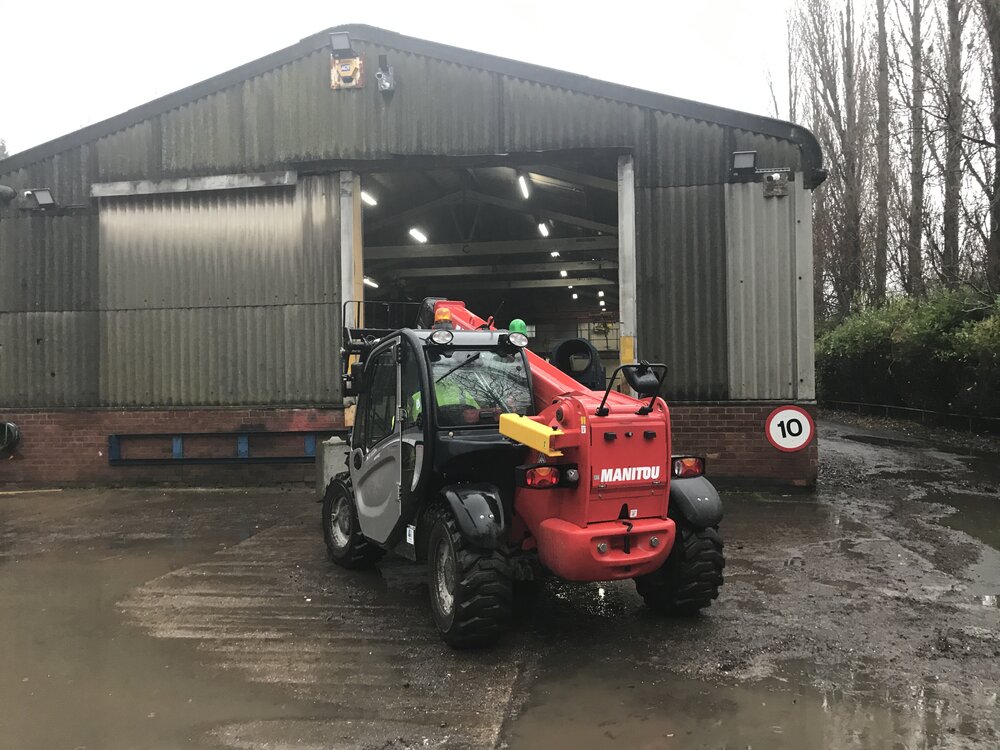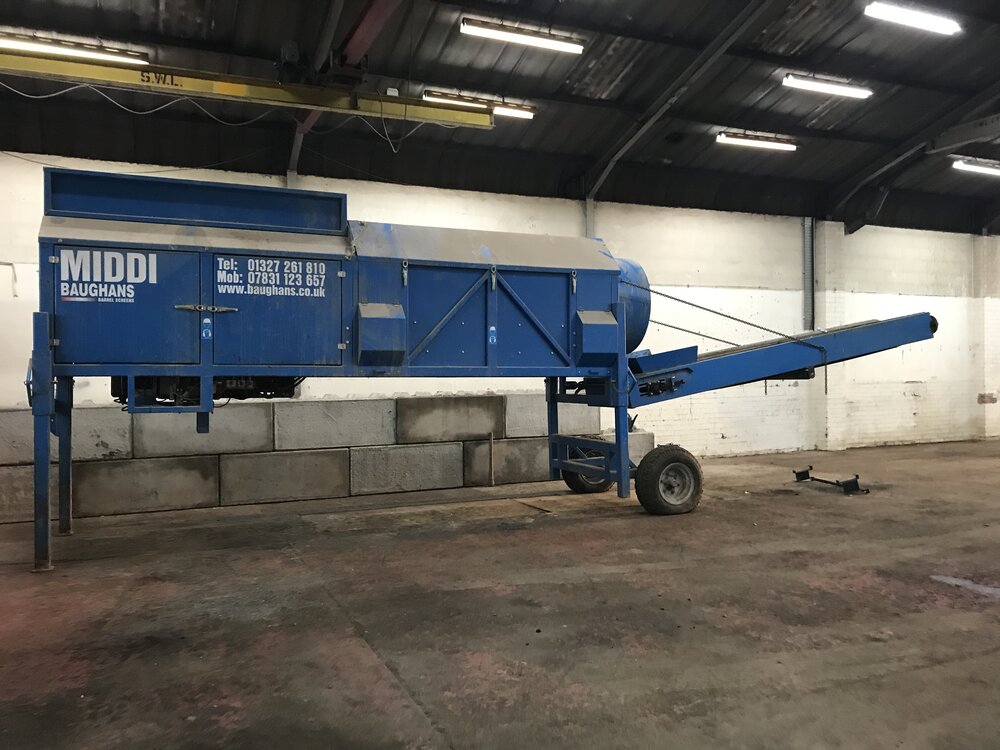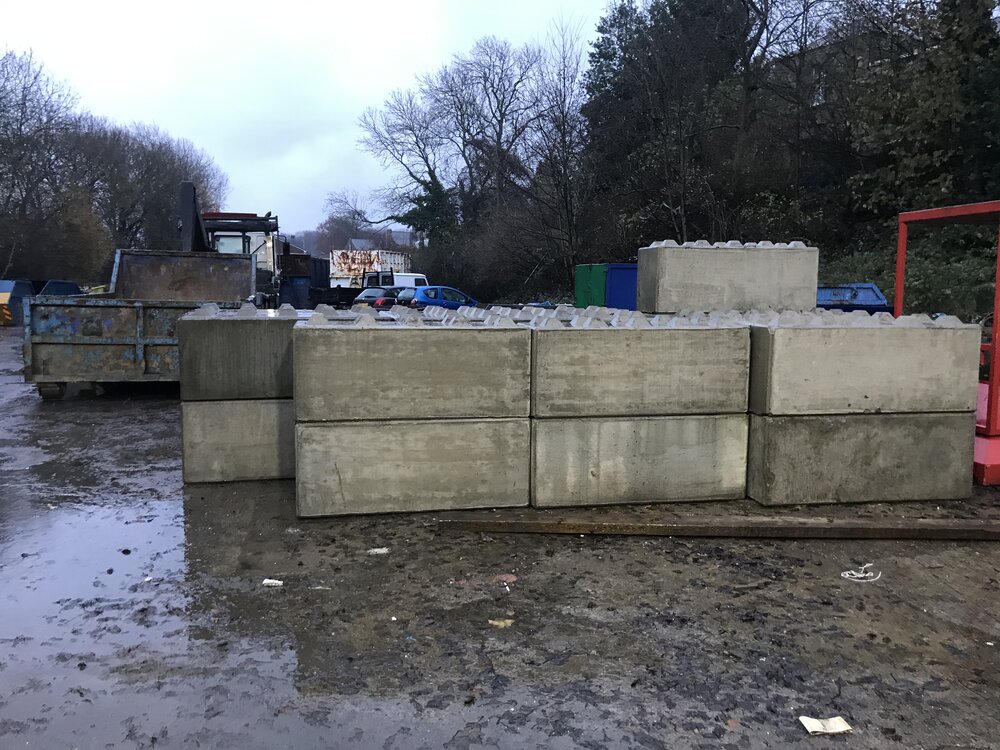Plant & Equipment
Mainly due to lack of funds when starting off the business I began without any ‘waste handling equipment’ also known generally as ‘plant equipment’, it isn’t fun and the time lost makes business operations extremely inefficient and expensive. Imagine tipping a skip on the floor with 8 tonne of soil in? We literally had to use shovels to move the material. However over the years I built up savings along with knowledge and began building and improving the business. I learnt what was required to make a small site processing approximately 20 skips a day to operate as efficiently as possible.
Loading Shovel
I’d say the piece of kit to priorotise first is some sort of loading shovel that will take care of the heaviest of the work namely the handling of the handle the heaviest of material, namely waste soil, clay and bricks. Our site started off small so a sensible investment seemed to be a Case 1845 C Skid Steer Loader. I was very lucky, the machine had one owner from new and was as they say in the industry ‘bullet proof’. However, as the business grew the machine struggled to keep up with the heavy work that was demanded of it. Later on in the growth of the company I invested in a brand new Manitou 365 from Lloyds in Newcastle. If setup is like mine was and your transfer station is quite small, then the Manitou 625 is nimble, quick and agile.
These are huge decisions to make at the early stages of the business. At the time a Manitou 625, brand new, cost approximately £39,000 plus VAT so I had to get the right machine, correct size etc first time round. The companies that sell these machines do usually offer to bring them to your site so you can test them out – I’d highly recommend doing this but, you don’t get a proper feel for the machine, whether it is up to to the task, until you’ve operated it properly on site for a while in various scenarios. In order to make a half decent educated guess, I’d recommend paying attention to the operations of other transfer stations when you’re in their sites tipping off or their meeting owners.
Just as important as finding the correct machine for the job is finding a good, reliable operator. A decent operator will respect the machine and maintain it to a high level. From my experience the best operators took their time and took care to complete their tasks in a professional and sensible manner. Often a poor machine operator would rush the job to get it complete as quick as possible. It cannot be overstated how much care and attention is required to operate a site like this in a safe manner. No point in building up a business to lose it all if an employ is in an accident and takes you to court. Have rigid procedures written up and signed by the operator. My method for creating these documents was to work with operators and run through all the different procedures of their jobs. From here I’d hand over the information to a qualified health and safety consultant to write up the information on a professional document.
Speaking of accidents, as a side note, insurance for this sort of work is difficult at the best of times to find and is always expensive due to the ‘high risks’ involved in the work being carried out. I’d highly recommend Avon Associates – Waste Management Insurance. They were always professional, efficient and affordable for getting the job done.

360 Selector Grab
I believe next on the list and in order of importance is a reliable 360 with a selector (rotator) grab. My fist machine was a Case CK50, 5 tonne. Once again, I was lucky and purchased a solid old workhorse from down South which done the trick for the first year or two.
Due to the increasing amount of waste passing though the transfer station on a daily basis it was necessary to upgrade the machine as breakdowns began costing a lot in terms of repairs and lost time.
Once again the heavy amounts of waste passing through the transfer station each day became too much for the old workhorse and the machine was upgraded to a brand new, JCB, 86C-2, 360. At 8.6 tonne operating weight this could pull through heaps of bulky waste at a super quick rate while also feeding the trommel drum. An efficiently operated, well maintained machine like this can do the work of 3 good men on the ground, picking out heavy objects and loading the feeder that drops into the trommel.
Trommel Drum
Before I started out on this adventure I had no idea what a trommel drum was. In simple terms, a trommel is like a giant tumble dryer, where waste is fed into it via a feeder belt and the waste passes through and trommel, where fines (dust) from the waste fall out of the drum and into a bay. I have wrote a full section on trommels fines and their tax rates that can be found here. When the larger corporate companies wanted smaller operators out of the game, it seems like the implementation of taxation on dust was one of the most effective ways of achieving this. As you can read in the trommel fines section (I’ll be writing in the coming weeks), separation of the dust doesn’t stop there, cleaning of fines is a whole other stage of the process. This taxtaion and a whole host of other pieces of legislation has led to the EU and UK Parliament gradually handing more and more of the work to lager corporate companies. This material from a waste processing operation could bankrupt a company in a matter of months or even a few weeks so it is important to have a something in place. For example when I set out, I mostly took work from house clearances as the dust was minimal. Once the trommel was in place we incoprtated more and more construction firms into our portfolio of customers. The amount of C&D waste(construction & demolition) increased, as did the fines, however our trommel and picking sations were in place to cope with the work.
What the trommel does is, it separates the dust out of the waste. What comes out the other end of the drum is waste above 20mm which can be picked off by operatives standing on the belt. If you have correct set up clean rubble will fall off the belt that can be later crushed and sold. It also makes separation of the other materials much simpler. Picking small pieces of waste off the floor by hand, especially small pieces mixed with dust is time consuming, back breaking and demoralising. Try find operatives who’ll do this at a fast pace all day – I never could. There are a whole host of various types of trommels for sale. I bought a Baughan Barrel – perfect for starting up first time. Simple to operate, not too big, easy to maintain and well manufactured.

Maintenance And Procedures
One of the most important pieces of advice I could give for anyone starting up is to regularly maintain their plant equipment. Processing waste is one of the dirtiest and heaviest of operations a piece of machinery could have to carry out. If your machine is offline for 3 hours every 12 weeks because its getting serviced then you’ve probably just saved yourself thousands of pounds in downtime and repair fees further down the line. Daily checks by staff are fundamental and should be included in your companies operational procedures. These things may seem like pieces of unnecessary red tape but actually save time and money keep good staff happier. For example, if an operator reports the machine has ran low on hydraulic oil in the middle of the day and they have signed their daily check book to say it was at a sufficient level in the morning – it is easy to find out who responsible for the issue.
Other Pieces Of Kit
Cardboard baler
Whether you’re processing construction and demolition waste or house clearance material, receiving lots of cardboard on site seems to be a guaranteed constant. A good baler can help keep tipping costs down, bring in a small revenue stream from rebates and free up quite a substantial amount of space due to the bulkiness of the material. Stacking the material in bales further reduces fire risk, creates more space and allows the site to operate in a more efficient and safe manner. My make of choice of baler would be an Orwak Baler however my experience of baling and storing waste cardboard is limited.
Concrete Lego Blocks
I’ve bought cheap and pid top dollar. Like most things in life you get what you pay for. Lego blocks are a fundamental part of the infrastructure in most waste transfer stations both big and small. I bought my concrete lego blocks from Titan Concrete. They’re a friendly, family run business that will deliver a high quality product on time. The blocks lock up in a very neat way and pull together tightly. Highly recommended.

Plant Hire
A piece of machinery goes down on what seems like the busiest day of the year and at the most inconvenient time possible, who can replace it while the fitter makes his way to site? I hired multiple 360 excavators from North East Plant Hire – another efficient, professional and easy to deal with firm.
For the hire of some sort of loading shovel or telehandler i’d recommend Northumbria Plant Hire. They’ve always got plenty of stock and can also repair plant equipment.
Skip Repairs
Every other week skips needed repaired, lugs coming off, holes appearing in the bottom, floors falling out or was more often the case – rotting out. I couldn’t recommend highly enough the professionalism of T-Service based on the Team Valley, Gateshead. The team there are perfectionists who are proud of the work they do. they charge a fair price and can make an old battered skip look like new.
